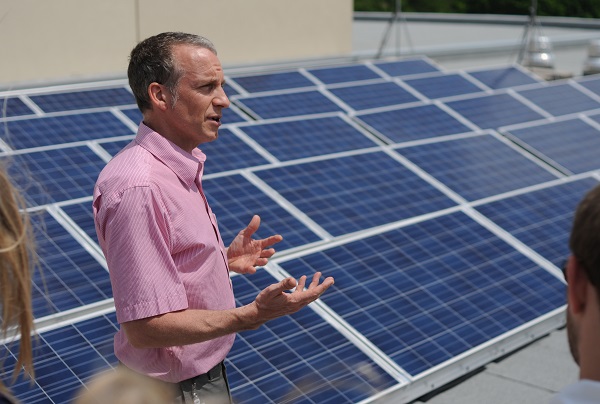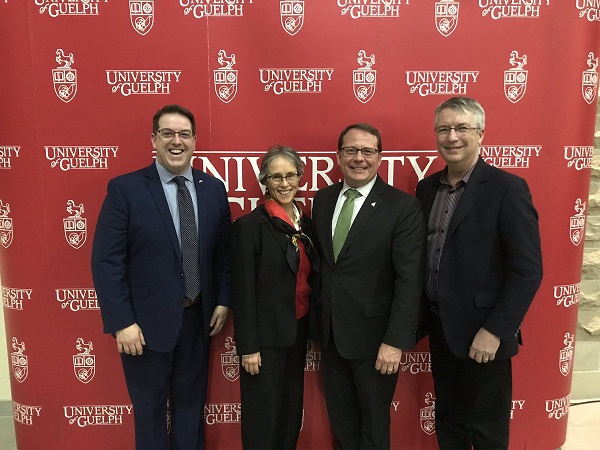This interview is part of the FCM–ICLEI series, PCP’s Local Climate Change Heroes, which features PCP program members.
The City of Guelph is known as a leader in clean energy projects. As the manager of the climate change office, Alex Chapman leads renewable energy and sustainability projects in Guelph and uses his expertise in business and in managing energy projects to help secure funding and demonstrate the financial returns of these projects. Alex’s biggest motivation is to create a clean future for his children (and, one day, grandchildren). He enjoys collaborating with colleagues in the city, the community, and across Ontario and Canada.

Q: What progress or achievements have you seen on climate change in the city of Guelph?
A: Guelph’s 2007 community energy plan was the first of its kind in North America. The plan was updated in 2018 with a revised goal of achieving a net-zero carbon community and a target of achieving 100 per cent renewable energy for corporate operations by 2050.
As the solar capital in Ontario, the city has already installed rooftop solar panels and solar hot water systems on 10 municipal facilities. The electricity generated from the systems is sold to the Independent Electricity System Operator as part of Ontario’s microFIT program. This provincial clean energy program purchases the electricity from individual renewable energy generation facilities with a fixed price contract over a 20-year term. Thanks to a very green-minded population (and the city’s hard work), Guelph now has 50 per cent higher rooftop solar uptake than the provincial average. The city also hosts the headquarters of Canadian Solar — the only top-tier solar module manufacturer outside of Asia.
Q: What do you find most rewarding about your work?
A: Helping to make innovative climate change ideas generated by the community become a reality is very rewarding for me. For example, I recently secured funding for a University of Guelph program directed by a small group of professionals. The program is called “My World, My Choice.” University of Guelph students mentor middle school and high school students in sustainability and inspire them to design and implement projects that reduce the ecological footprint of their schools. The projects target different areas of sustainability, such as promoting community gardens or improving the energy efficiency of their school facilities.
I am also highly involved in the following three communities of practice in the form of online tool learning and sharing, webinars and in-person meetings:
- QUEST’s community energy plan implementation network
- The Ontario Energy Community of Practice (ECOP): The network promotes mutual learning opportunities of Municipal Corporate Energy Managers in Ontario. The network provides tools and resources for community energy planning activities.
- Guelph energy managers: a cross-sector energy management community of practice.

Q: What does the future hold for climate change in the City of Guelph? What projects are in the works next?
A: The City of Guelph currently has several mitigation projects going on, including a waste power generation system that uses the methane from the waste treatment plant to generate power, and a combined heat and power system at the West End Community Centre. A new energy-efficiency retrofit program will be presented to council later this year with a focus on social and low-income housing. The program will provide homeowners with easy access to incentives and possibly financing options. The program targets residential buildings, but may also be open to industrial, commercial and institutional (ICI) sectors. An LED streetlight retrofitting program is also on the agenda. The city has already completed a trial testing different types of streetlights. The project is estimated to cost $8 million with a payback period of six years.
Let’s connect!
Alex can tell you about his experience in:
- Communities of practice
- Community stakeholder engagement (especially with large groups)
- Collaboration with academic institutions
Contact information
Alex Chapman
Manager, Climate Change Office
Facilities Management
Infrastructure, Development, and Enterprise
City of Guelph, ON
T. 519-822-1260, ext. 3324
Photo Credits: City of Guelph

